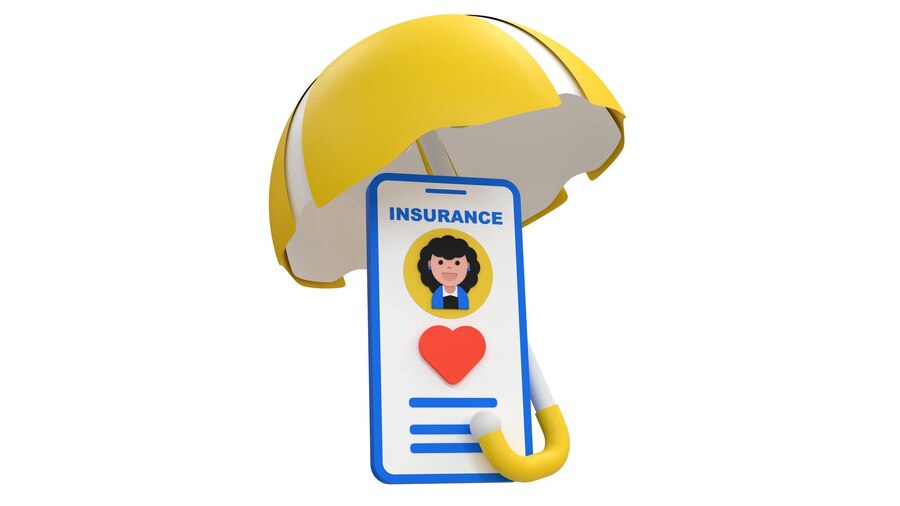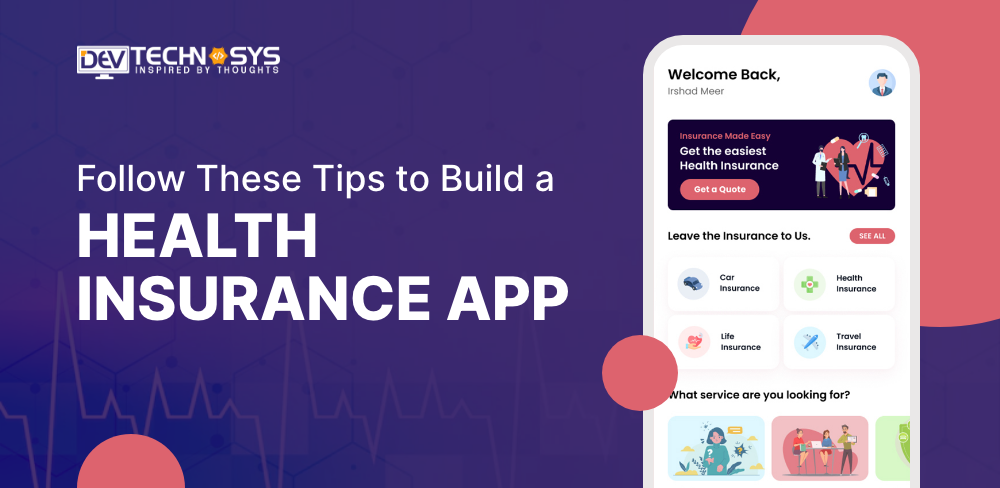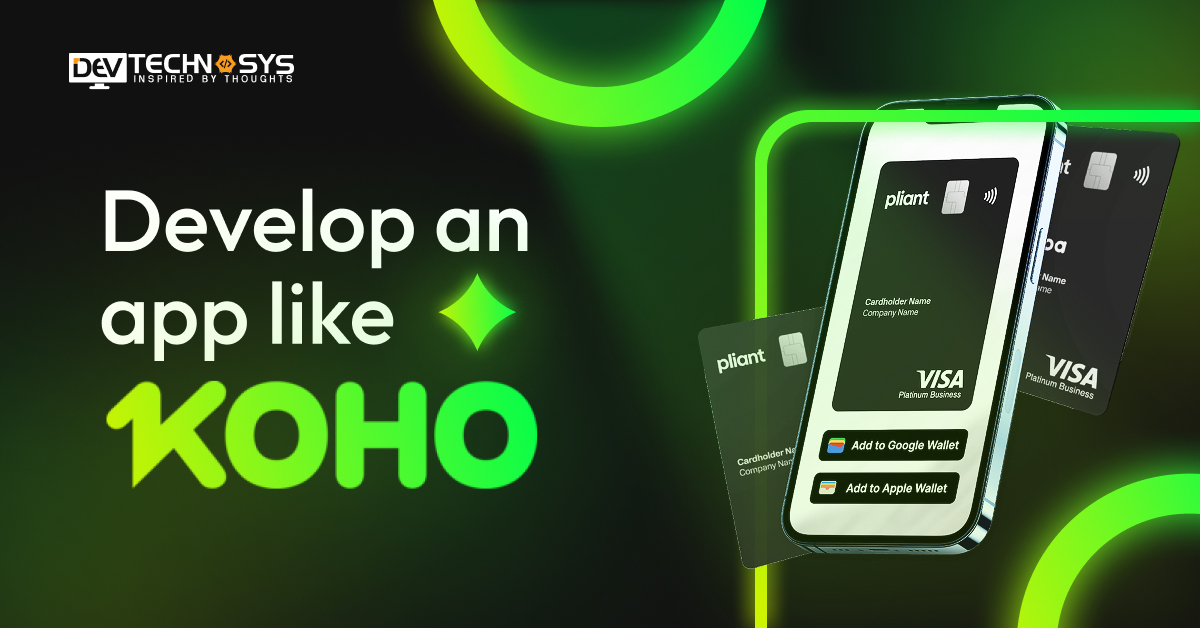If you are reading this blog, we will conclude as someone interested in knowing the steps to Build a Health Insurance App. However, by witnessing the demand for building a healthcare insurance app, we understand your concern.
Today getting worried for personal safety has been a forever thing for individuals. People, therefore, make every effort to safeguard themself against damage.
Due to the increase in healthcare demand, mobile app development has come up with something marvelous to help individuals.
It’s how many health insurance companies first arrived on the marketplace. However, it is vital to know that only some companies in this industry take the requirement for a health insurance app into account.
So if you’re looking forward to Building a Health Insurance App for business purposes, then you must know its development, cost, features, and market study to make sure everything runs smoothly in development.
We have covered everything you’re looking for in this blog, so let’s save time and dive into this blog further.
Analyze The Market of Insurance Mobile App Solutions
Before going further in this blog, you should read these essential market studies on healthcare insurance mobile app solutions.

- Approximately 5% of Americans who used health insurance apps between January 2020 and January 2021 even used the UPS app.
- The percentage of Americans who used specific health insurance applications between January 2020 and January 2021 is seen in this data.

- According to the Statista World Survey Conducted, which was done in 2022, the information shown regarding the most popular categories of health apps purchased by adult Americans in the previous 12 months is based on that survey.
- The most common category of health for me app acquired by Americans was nutrition-related apps, with 43% of respondents doing so.

- With over 36% higher app instals than the preceding period, January 2021 in the USA saw the most significant monthly gain in health insurance app downloads over the preceding year.
- From Jan 2020 to January 2021, the number of health insurance app instals increased monthly in the US.
- This report displays the size of the global market for digital health by major market category for specific years between 2015 and 2025.
- The global market for mobile health was predicted to be worth about 23 billion dollars in 2016. By 2025, it is anticipated to reach around 190 billion dollars, with the digital health market accounting for most of this development.
What Is A Healthcare Insurance App?

A health insurance app can perform various crucial tasks, such as helping users select trustworthy doctors or quickly access the medical support they need.
However, knowing the healthcare insurance app benefits a provider by increasing the number of devoted customers it has, naturally increasing total income.
When you Build a Health Insurance App, it will raise the level of customer service by removing the issues with long lines and overly generalized patient satisfaction.
Guide Of Features Included in Healthcare Insurance App
When you’re about to Build a Health Insurance App, you must know that the development is only completed by learning about the features of healthcare insurance apps.
So here we have mentioned all the essential features of the best health plan app to help you build your own.
1. User Profile
It is the feature where users will create their profile on a healthcare insurance app through their email and phone number, which will help health professionals monitor patients’ health regularly by reviewing test results.
2. Assessment of Health Insurance Plans
Users can use a mobile app to compare the advantages of several insurance plans and make the best decision for their needs.
The healthcare insurance app can educate users on the benefits and drawbacks of several coverage plans, allowing them to compare them and arrive at informed judgments.
3. Management of Claims
Examining, searching, and bookmarking assertions in a health plan app must be efficient processes. It must be simple for every user to manage their documents. Users feel at ease to file, verify, and monitor the status of pending claims directly from their mobile devices.
4. Purchasing or Renewing Health Insurance
The ability to purchase a plan on the app must be available once the user has discovered one that meets his needs. For the policy to remain valid and provide ongoing coverage, he should also be able to update the plan.
5. Management of Payments
A trustworthy health insurance application should be adaptable in terms of the payment options it provides.
It is vital to know that the app should have the ability to sign up new clients quickly, automate the processing of invoices, maintain contractual & payment contacts, and provide configurable commission and incentive calculations
6. Making and Changing Reservations
Users must be aware of the procedures for necessary permits using a medical insurance app to set up consultations when the plan is selected.
From the inside of the app, patients must be allowed to modify or reschedule their planned meetings.
7. Communication with Health Professionals
This feature, where live text chat with doctors, will allow patients to communicate with their doctors often. However, every healthcare insurance app has three primary communication types: voice calls, video calls and chat.
8. Reminders & Alerts
It is a helpful feature for doctors and patients as it reminds patients of appointments and insurance payment deadlines. Hence it will help doctors in miscommunication between two appointments simultaneously.
9. Media Sharing
For every healthcare insurance app, this feature is way too important. With the help of the media sharing feature, a patient can share the document of medicines or reports for review by doctors.
Read More: Generative AI in insurance
How To Build a Health Insurance App?
The wait is over! Now that you have read about the fantastic features and functions of healthcare insurance apps, you must know that it will take a lot of skill and experience to build them.
In this section, we have built a step-by-step guide that will help you to build a health insurance app.
1. Define Target Audience
It is the initial stage of building a health insurance app where entrepreneurs must define their software’s target audience.
A healthcare insurance mobile application can be built for patients, healthcare providers or internal processes of an insurance company.
It is crucial to understand that in today’s scenario, every healthcare insurance app must have a combination of all three models to target every type of individual.
However, the software should be practical and effective, resulting in massive user engagement on your healthcare insurance apps.
2. Analyze Competitors and Market
In this phase, you must analyze a healthcare insurance mobile app to build a health insurance app.
The competitor research offers you a case study of how they invest in unique platforms for user engagement and will also guide you toward modifying users’ needs according to trends.
Many businesses state that they found that market research and competitor studies help build a healthcare insurance app.
A market study will give you basic knowledge about the business model, revenue product, and policies you must add to your healthcare insurance mobile app.
3. Designing
Design is the most critical and user-orientated step in building a health insurance app. When it comes to designing healthcare insurance apps, you must know that there is a massive amount of data associated with products, services and patients.
However, showcasing the application’s data in a simple yet attractive way is indispensable. Additionally, it is essential that hiring the best hybrid app development company will help you in designing the most attractive user interface for your healthcare.
Numerous businesses must understand that every business needs to be unique and effective in design. Hire dedicated developers that can offer you an intuitive and straightforward healthcare app which will offer the users function with fingertips.
4. Mobile App Prototyping
If you’re hiring the leading insurance app development company, it will indeed work to offer you a mobile app prototyping of your healthcare insurance app; however, only some mobile app developers offer a prototype.
It is essential to know that every mobile app development process must start before reviewing the beta version. If there are issues in the app, they will be disclosed in the prototype, which will save the app from ruining the first impression on the platform.
Hence this mobile app prototyping will offer you crucial feedback on the developed app and guide the developer to remove bugs and stability enhancement for the final release.
A mobile app prototype will effectively save time and cost in building a health insurance app.
5. Develop Healthcare Insurance App
Here comes the most awaited moment of this blog. It is the phase where you should hire mobile app developers to build a health insurance app according to your business requirement.
Hence this step will take a few months as generally, the development of mobile healthcare apps takes more than 3 to 6 months.
However, it is essential to know that during the development phase, it is recommended to communicate with the developers regularly to know every modification in development.
Many businesses must avoid this site, resulting in miscommunication between the developers and owners. So make sure to communicate properly during development.
Moreover, there is another thing you should take care of, which is deadlines. Ensure that your developers provide the application with effective deadlines, as messing with the deadlines may cause significant losses.
6. Testing & Launch
Right after the phase to build a health insurance app, it is essential to ensure that the app your dedicated developers have created is bug-free.
So before publishing the mobile app on the google or apple app store, it is crucial to know that it is flawless. Every insurance app development company offers to test and maintain stability right after the development to ensure that your app is excellent without glitches.
The testing will help analyze the unusual errors and glitches acquiring the app that may lead to crashing. Every developer must deliver a healthcare insurance app that has a smooth and fast experience.
Healthcare Insurance Mobile App Models
When it’s about creating healthcare insurance mobile apps, you must go through a case study on different models of healthcare insurance apps.
In this section, we have gathered our data from reliable sources to compile a brief on different models of healthcare insurance, so make sure to read these carefully.
1. App For Health Insurance Patient App
Patients may require a way to obtain essential criteria regarding their overall health quickly.
A health insurance app for patients typically serves as an online filing system for structured patient medical records and details on how health insurance advantages and disputes are processed.
However, it is vital to know that the healthcare insurance application linked insurance information from various sources in one location, allowing customers to enjoy life more and less time maintaining their healthcare. Additionally, it is essential to remember that patients can benefit from a medical insurance app, as it will examine these other benefits shortly.
2. App For Healthcare Providers
Another model of healthcare insurance mobile application is for healthcare providers. The ability to seamlessly access any data they require from a particular source can be given to healthcare organizations by creating an app for consumers.
A health insurance app will incorporate new technologies as part of the journey toward healthcare digitization and make the daily tasks associated with managing liability issues less onerous.
However, you must remember that these tasks include verifying the validity of the documents, determining whether a patient is eligible for direct billing, and more.
In addition, many healthcare professionals want a customized solution to do tasks quickly, and the usage of an insurance app for healthcare professionals helps sustain collaboration is essential.
3. App For the Processes Inside Insurance Companies
As we all know, insurance is the most conventional sector overall, and technology has influenced insurance more and more over the past few years. All the players in the healthcare industry are motivated by the desire to keep coverage affordable in this situation.
It forces insurers to acquire the adaptability and elasticity required to ensure that the patients they cover are happy and receive assistance as needed.
However, you must know that with the help of this healthcare insurance app, Insurance providers can help customers negotiate the complications this may involve.
Cost Estimation – Cost Analysis Of To Build a Healthcare Insurance App
You must have information to build a health insurance app, but developing the health insurance app is only appropriate with knowing its cost.
As we promised, we have included everything in this blog that will give you a full-fledged successful healthcare insurance app.
The cost to build a health insurance app is somewhere around $10,000 to $50,000. Additionally, to help you better understand, we have built a table of costs with a price range and approximate pricing that will benefit you.
| Region | Price Range | Approximate Price |
| North America | $10–225 | $168 |
| Australia | $32–142 | $110 |
| Western Europe | $32–167 | $70 |
| South America | $21–107 | $34 |
| Eastern Europe | $20–97 | $35 |
| India and Asia | $8–80 | $26 |
However, the cost of building a health insurance app varies depending on several factors. Below we have compiled a list of factors affecting the cost of building a health insurance app.
- Type of Platform
The variety of platforms you want to build a health insurance app can increase the cost.
- Features and Functions
The required amount of features & functions you want in your health insurance app development may increase the cost.
- UI & UX Design
App design costs increase with the complexity of the design (such as animations).
- Duration of Development
The expected time frame for developing your app may increase the cost of building a healthcare insurance app.
- Choice of Tech Stack
Native or cross-platform, Laravel, Python, Twilio, Push.io, Nexmo, AWS, Google, Azure, HBase, Cassandra, Postgres, and MailChimp Integration, among other technologies, make up the tech stack.
- AI Intelligence
Using cutting-edge technologies like artificial intelligence and machine learning to build a health insurance app can increase costs.
- Application Maintenance and Support
The post-development phase of healthcare insurance software may require application maintenance and support that will increase costs.
- Development Team Location.
Mobile app development services provider location can increase the overall cost of creating a healthcare insurance app. For instance, programmers in the USA often charge more than developers in India. Team size for the development project
What’s Next!
It was evident that building a healthcare insurance mobile app has enormous potential. An industry that is amenable to innovation is health insurance.
Creating a bright health insurance app is one of the best alternatives for enhancing consumer satisfaction, care quality, and engagement.
However, everything is possible if you have a team of knowledgeable and skilled mobile app developers.
The most important thing every business must keep before starting a development process is that every mobile app development services provider can build healthcare insurance apps that offer you success.
Choosing the best and leading software development company can help you in effective and efficient healthcare insurance app development.
Get in touch with our team to get your health insurance app off the ground.
Frequently Asked Questions
What are the techniques used to build a healthcare app?
When it comes to building a healthcare app, you must know that Node.js, Express.js, Laravel, MySql, MongoDB, Redis, AWS, Vultr, NGiNX,, Swift for iOS, Kotlin for Android, Principle, Figma, React Native, Balsamiq, Slack, Jira, and Confluent are some of the significant tech stack used in creation.
What is the monetization model of healthcare insurance apps?
Medical app development can benefit healthcare and financially reward the app’s creator. Here are the nine mobile monetization techniques that can be used with mobile medical apps. The most common methods for monetizing mobile apps are listed below.
- Freemium
- Certified content
- Localized advertising campaigns
- Registration and subscription fees
- Promotions
What is the best healthcare insurance app?
According to the National Committee for Quality Assurance’s state data, the best health insurance providers are Kaiser Permanente and Blue Cross Blue Shield (NCQA). Aetna and UnitedHealthcare are mid-tier insurers.





























